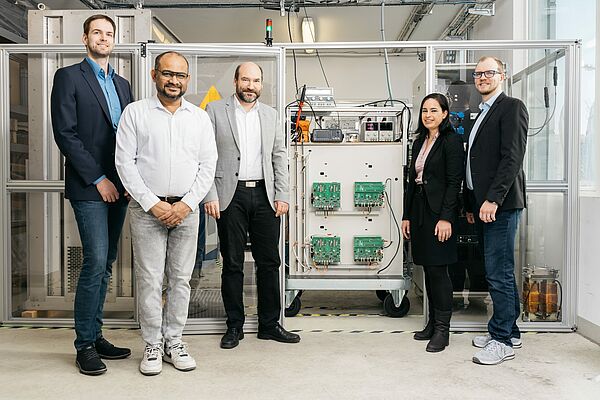
Fotocredit: Alexander Müller / B&C Privatstiftung
New technology drastically reduces loading times
The pioneering MEDUSA project, which is coordinated by the Centre for Energy at the AIT Austrian Institute of Technology, focuses on the development of multi-megawatt fast-charging stations with a direct connection to the medium-voltage grid in combination with an efficient and sustainable energy supply. This technology is crucial to making electromobility economically viable for the future, especially in heavy goods transport. Previous charging stations require around 4.5 hours to charge a typical 400 kWh bus battery; MEDUSA reduces this time to just eight minutes. The combination of battery storage systems and photovoltaics minimises emissions. Medium-voltage technology is key to the worldwide electrification of heavy goods transport.
"This award emphasises how crucial applied cutting-edge research is for the competitiveness of our business and technology location. MEDUSA stands for innovative solutions with direct market relevance - this is exactly what is needed to successfully bring new technologies into application," emphasises Brigitte Bach, AIT Managing Director and Spokesperson of the Management Board.
Alexander Svejkovsky, AIT Managing Director, adds: "Winning the Houska Prize impressively confirms our strength in successfully utilising innovations. MEDUSA is a prime example of how we specifically transform research results into market-oriented solutions and thus create sustainable economic added value for Austria."
Innovation with practical effectiveness
Project leader Prof. Dr Markus Makoschitz, Principal Scientist at the AIT Austrian Institute of Technology and Professor at the University of Leoben, explains: "I am very pleased about this award, because I see it as a great appreciation for the outstanding achievements of the colleagues at the AIT and our partners. We focus on smart, economical solutions, performance, efficiency and market relevance. Only then will our multi-megawatt fast-charging stations really be effective in practice."
From conceptualisation to application maturity
The MEDUSA project, launched in 2021 and currently in its second implementation phase (2024-2027), focuses on the construction of a large-scale demonstrator and on analyses of geographical conditions and traffic flows in conjunction with network simulations. MEDUSA is funded as part of the Zero Emission Mobility 2023 programme of the Climate and Energy Fund (https://www.klimafonds.gv.at/foerderung/zero-emission-mobility-zem-2023/). In addition to the coordinating organisation AIT Austrian Institute of Technology GmbH, the following partners are involved in the project: AVL List GmbH, Infineon Technologies Austria AG, EnerCharge GmbH, Lotus Wireless Technologies India Private Ltd, Virtual Vehicle Research GmbH, Miba Cooling Austria GmbH & Co KG, Vienna University of Technology and the University of Leoben.
Further information:
www.ait.ac.at/themen/power-electronics-system-components/projekte/medusa



